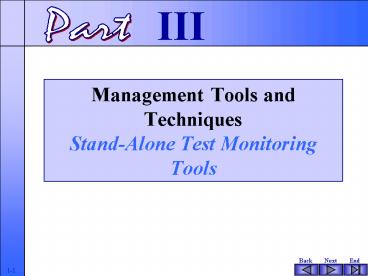Management Tools and Techniques StandAlone Test Monitoring Tools - PowerPoint PPT Presentation
1 / 15
Title:
Management Tools and Techniques StandAlone Test Monitoring Tools
Description:
Test Devices and Interface Testers. Protocol Analyzers. Tools from the Internet Environment ... dedicated devices for high speed protocols or as software ... – PowerPoint PPT presentation
Number of Views:142
Avg rating:3.0/5.0
Title: Management Tools and Techniques StandAlone Test Monitoring Tools
1
Management Tools and TechniquesStand-Alone Test
Monitoring Tools
III
Part
2
Stand-Alone Test Monitoring Tools
Chapter 12
3
Learning Objectives
- Test Devices and Interface Testers
- Protocol Analyzers
- Tools from the Internet Environment
- Chapter Summary
4
Stand-Alone Test Monitoring Tools
- What are stand-alone tools?
- Tools used as aid in isolation, not integrated in
a management system or a management platform - Troubleshooting Tools?
- Management Tools?
- Criteria for Stand-Alone Tools
- What can be tested? (different transmission,
media, interfaces, components) - What transmission level can be tested? (signal
generated) - Interaction options for test equipment (passive
or active analysis) - Testing during network operations (interruption
of normal operation) - Does the test equipment required complete
installation? (portable) - How does the tool fit in a larger scheme of
integrated network and system management
5
Test Devices and Interface Tester
- Elementary test tools
- Analog test devices check for signal behavior
during analog transmission - Analog test devices measure voltage level,
resistance, jitter, modulation, attenuation,
signal-to-noise ration and bandwidth - Digital test devices check for digital
transmission paths and device interfaces - Multimeters used to measure the voltage,
current, and resistance of electrical conductor - Time domain reflectometer (TDRs) - send pulses
to electrical media and measure the time until
the possible return of a partial reflector (the
reflector can occur in a broken cables, passive
branching).
6
Test Devices and Interface Tester
Test Devices
Digital
Analog
Frequency generator Circuit quality monitor
modem Multimeter Time domain reflectometer Osci
lloscope
Breakout box Bit error rate tester Block error
rate tester Modem tester DTE/DCE emulator Data
recorder
7
Test Devices and Interface Tester
- Circuit quality monitor CQM allows almost all
the quality parameters of an analog line to be
monitored - Oscilloscope used to determine so-called eye
patterns - that are characteristic patterns of
modulated signal. - Frequency generator perform test involving
energy loss of the test signal using a decibel
meter (test on twisted-copper cable) - Digital devices include a broad spread of
equipment ranging from breakout boxes to protocol
analyzers
8
Test Devices and Interface Tester
- Digital devices
- Breakout boxes the simplest form of digital
test equipment used to test plug connections and
interfaces (electrical interfaces V.24, V.35,
RS.449, RS-332) - Bit rate testers (BERT) creates test patterns
that can be transmitted to the circuit or device
being tested (modem) and mirrored their loopback
mode. - Block error rate tester (BLERT) test entire
block - Data recorders record traffic for offline
analyzers a stand alone tool.
9
Protocol Analyzers
- Protocol Analyzers - tools for network
administrator. - Capable of eavesdropping, storing, and analyzing
network traffic - Requirements of Protocol Analyzers
- Perform complete recording and storage of the
network traffic being observed (time stamp on
media such X-25, ATM) - Extensive filter facilities. Definition of
filters using Boolean expression, starting the
protocol recording, and support of alarm - User friendly interfaces for the network
administrator - Support for monitoring traffic over different
types of media and multichannel measurements - Provision for facilities for testing the physical
state of lines - Collection and clear presentation of statistical
information on network load and error rates - Automatic detection of changes describing network
configuration - Facilities for remote operation
- Online and offline analysis of test results
- Convenient facilities for storing and
reactivating analyzer configurations
10
Protocol Analyzers
- Protocol analyzers are implemented in dedicated
devices for high speed protocols or as software
packages that run on PCs and workstations - Recording filters describes the following
variants - All packets
- All defective packets
- All packets with predefined types of errors
- Senders
- Destination or traffic volume
- Packets of a certain type (broadcast)
- Protocol analyzers can analyze only certain
predetermined protocols.
11
Protocol Analyzers
- New protocol analyzers developments
- Protocol analyzer usually addresses only one
transmission link or one segment. - Protocol analyzer as a distributed monitoring
system - Allows for the separation of the recording part
from the analyzer and using the corresponding
module as a measurement probe in each network
segment being monitored - Tools from the Internet Environment
- The Internet has fostered the development of a
number of useful individual tools - Most of which are available as standard O/S
features or public domain software solutions - Tools for network management
- Tools for system management
12
Tools from the Internet Environment
- Tools for network management
- Tools for monitoring and debugging TCP/IP
Internets and Interconnection devices - Organized by functional groups (map, status,
traffic, security, debugger, analyzer, and alarm) - Network components with O/S (O/S2, NT, Windows,
UNIC, etc.) - ICMP and SNMP are the basic protocols
- Examples ping (network reachability analysis
using ICMP echo packet) - Tools for system management
13
Tools from the Internet Environment
- Tools for system management
- Less tools in the area of system management
- Few tools are found for UNIX O/S environment and
some are vendor specific - Examples rup (to calculates fault-free runtime
of remote computers). rusers (identifies users
of a machine). rpcinfo (lists services of a
server). fuser (list users of a system) - Tools are management architecture independent, do
not require special purpose-agents, they rely on
the O/S. - Stand-alone tools do not satisfy integrated
management requirements
14
Summary
Key Terms
- Review your slide notes in details
- All covered chapters
15
Next
Stand-Alone Test and Monitoring Tools
Chapter 13































